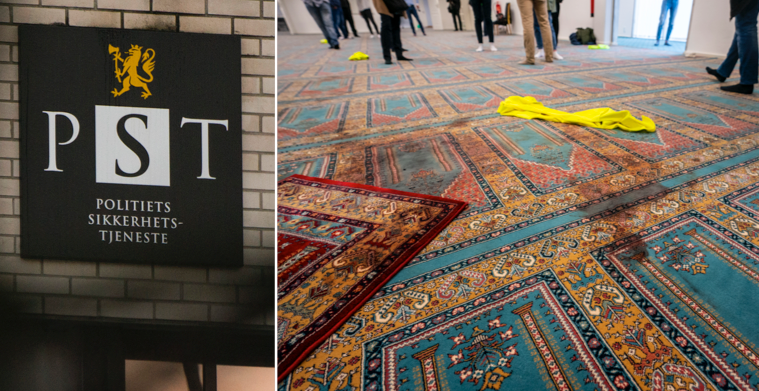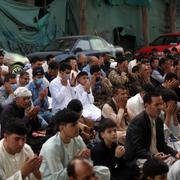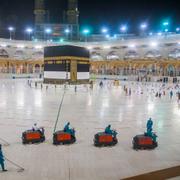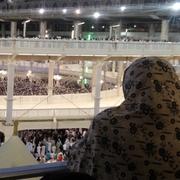
Norge befarar terrorbrott under eid al-adha-firandet
Norska säkerhetspolisen PST befarar att högerextrema grupper kan planera terrorbrott under den muslimska högtiden eid al-adha i helgen, rapporterar Dagbladet.
I en ny rapport bedömer PST att offerfesten kan vara ett symboliskt mål för högerextrema. Dessutom kommer ett stort antal muslimer att samlas.
Samtidigt understryker PST att det inte föreligger något specifikt hot mot firandet.
bakgrund
Eid al-adha
Wikipedia (en)
Eid al-Adha (Arabic: عيد الأضحى, romanized: ʿīd al-ʾaḍḥā, lit. 'Feast of the Sacrifice', IPA: [ʕiːd alˈʔadˤħaː]) , also called Eid Qurban (Persian: عيد قربان), is the second of two Islamic holidays celebrated worldwide each year (the other being Eid al-Fitr), and considered the holier of the two. It honors the willingness of Ibrahim (Abraham) to sacrifice his son Ismael as an act of obedience to God's command. But, before Ibrahim could sacrifice his son, God provided a lamb to sacrifice instead. In commemoration of this intervention, an animal, usually a sheep, is sacrificed ritually and divided into three parts. One share is given to the poor and needy, another is kept for home, and the third is given to relatives.
In the Islamic lunar calendar, Eid al-Adha falls on the 10th day of Dhu al-Hijjah, and lasts for three days. In the international (Gregorian) calendar, the dates vary from year to year shifting approximately 11 days earlier each year.
Läs mer om pilgrimsfärden till Mecka
bakgrund
Hajj
Wikipedia (en)
The Hajj (; Arabic: حَجّ Ḥaǧǧ "pilgrimage"; sometimes also spelled Hadj, Hadji or Haj in English) is an annual Islamic pilgrimage to Mecca, Saudi Arabia, the holiest city for Muslims. The pilgrimage, which lasts approximately 5 to 6 days depending on the lunar Islamic calendar, is a mandatory religious duty for Muslims that must be carried out at least once in their lifetime by all adult Muslims who are physically and financially capable of undertaking the journey, and can support their family during their absence.In Islamic terminology, Hajj is a pilgrimage made to the Kaaba, the "House of God", in the sacred city of Mecca in Saudi Arabia. The rites of Hajj are performed over five or six days, beginning on the eighth day and ending on the thirteenth day of Dhu al-Hijjah, the last month of the Islamic calendar. It is one of the Five Pillars of Islam, alongside Shahadah, Salat, Zakat and Sawm. The Hajj is the second largest annual gathering of Muslims in the world, after the Arba'een Pilgrimage in Karbala, Iraq. The state of being physically and financially capable of performing the Hajj is called istita'ah, and a Muslim who fulfills this condition is called a mustati. The Hajj is a demonstration of the solidarity of the Muslim people, and their submission to God (Allah). The word Hajj means "to attend a journey", which connotes both the outward act of a journey and the inward act of intentions.The pilgrimage occurs from the 8th to 12th day (or in some cases 13th ) of Dhu al-Hijjah, the last month of the Islamic calendar. Because the Islamic calendar is lunar and the Islamic year is about eleven days shorter than the Gregorian year, the Gregorian date of Hajj changes from year to year. In 2020 CE (1441 AH), Dhu al-Hijjah extends from 22 July to 19 August.
Ihram is the name given to the special spiritual state in which pilgrims wear two white sheets of seamless cloth and abstain from certain actions.The Hajj is associated with the life of Islamic prophet Muhammad from the 7th century AD, but the ritual of pilgrimage to Mecca is considered by Muslims to stretch back thousands of years to the time of Abraham. During Hajj, pilgrims join processions of millions of people, who simultaneously converge on Mecca for the week of the Hajj, and perform a series of rituals: each person walks counter-clockwise seven times around the Kaaba (a cube-shaped building and the direction of prayer for Muslims), trots (walks briskly) back and forth between the hills of Safa and Marwah seven times, then drinks from the Zamzam Well, goes to the plains of Mount Arafat to stand in vigil, spends a night in the plain of Muzdalifa, and performs symbolic stoning of the devil by throwing stones at three pillars. After the sacrifice of an animal (can be accomplished by using a voucher (see below)), the Pilgrims then are required to either shave or trim their heads (male) or trim the ends of their hair (female). A celebration of the three-day global festival of Eid al-Adha proceeds thereafter.Muslims may also undertake an Umrah (Arabic: عُمرَة), or "lesser pilgrimage" to Mecca at other times of the year. But this is not a substitute for the Hajj and Muslims are still obligated to perform the Hajj at some other point in their lifetime if they have the means to do so.In 2017, the number of pilgrims coming from outside the Saudi Arabia to perform Hajj was officially reported as 1,752,014 and 600,108 Saudi Arabian residents bringing the total number of pilgrims to 2,352,122.In June 2020, while not cancelling the Hajj outright, the Saudi Government announced that they would only welcome "very limited numbers" of pilgrims who are residents of Saudi Arabia due to the global COVID-19 pandemic.
Omni är politiskt obundna och oberoende. Vi strävar efter att ge fler perspektiv på nyheterna. Har du frågor eller synpunkter kring vår rapportering? Kontakta redaktionen


